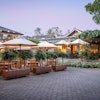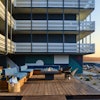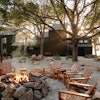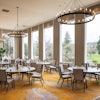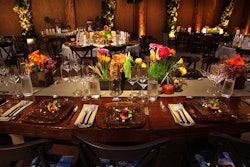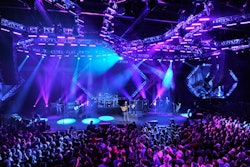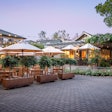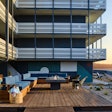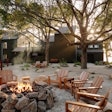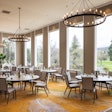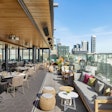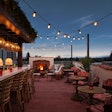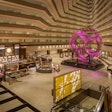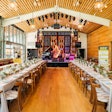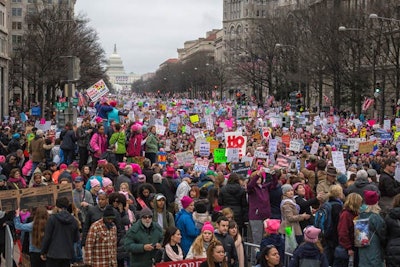
The pace of news seemed to move a mile a minute in 2017, as President Trump's inauguration brought sweeping changes to almost every industry—including events. Natural and man-made disasters also impacted the world of events, as did the sexual assault claims against Hollywood producer Harvey Weinstein and other prominent bigwigs.
Read on to see how four major news stories affected the event industry, and click through to the linked articles to find more BizBash coverage on the subject.
1. The Inauguration of President Donald Trump
President Trump's inauguration had arguably the biggest impact on the United States this year—and that extended to the world of events. Planners and brands that had stayed out of politics in the past felt compelled to speak out, shepherding in a new era of activism in the event world.
Just three weeks into the new year—the day after the January 20 presidential inauguration—was the historic Women’s March. Organized by four female activists, the march became the largest single-day protest in American history. All together, the attendee tally soared close to five million people, spread across every continent in the world, with roughly 500,000 in Washington and 750,000 in Los Angeles alone. Event organizers looked to the march for guidance on how to use social media and innovative face-to-face organizing techniques in the new political climate.
The inauguration itself differed from years past, offering a more scaled-back vibe, with only three official balls instead of the 10 during President Obama’s first inauguration. There were also reports that organizers had trouble finding celebrity talent willing to perform at the inauguration.
After the inauguration, event planners expressed uncertainty about how the industry—and specifically the Washington event scene—would react to the new administration. Throughout the year, though, a vibe of activism popped up at events, such as the Watermill Center’s annual benefit and Refinery29’s 29Rooms exhibitions in New York and Los Angeles. Reliably political events such as the Global Citizen Festival experienced a surge of interest from donors and sponsors. And, of course, award shows such as the Oscars and the Emmys featured a slew of passionate speeches touching on immigration, women’s rights, racism, and more. The N.F.L. also entered the spotlight, as players began kneeling during the National Anthem to protest police brutality—leading to many conservative football fans planning to boycott the league. It remains to be seen how the protests will affect the Super Bowl in February 2018.
The venue and hotel world was also affected by the election. Charities such as the American Cancer Society and the Cleveland Clinic—which had long hosted benefits at Trump’s Mar-a-Lago—pulled their events from the Florida resort. On the flip side, though, the president’s star power lead to increased ticket sales for some organizations that continued to host events at the property. Meanwhile, Eaton Workshop, an anti-Trump hotel for liberals that will offer guests activities such as progressive fireside chats and materials for protest posters, is slated to open in Washington in spring 2018.
Many tourism and hotel industry experts worried that a rise in anti-immigrant sentiment would affect the number of visitors to the United States. Indeed, New York City saw an overall rise in visitors in 2017—but a decrease in international visitors.
In such a divisive political climate, however, event planners noted the unique power of live events to bring people together, as organizations such as the Bacon & Lox Society created interfaith gatherings.
[PULLQUOTE]
2. The Manchester Bombing and the Las Vegas Shooting
In the wake of violent incidents such as the terrorist attack at an Ariana Grande concert in Manchester, England, in May, as well as the mass shooting in October at the Route 91 Harvest country music festival in Las Vegas, planners took a hard look at event security.
Some event organizers redefined and reevaluated their security measures, considering options such as R.F.I.D. technology to prevent “pass-backs” of tickets. Former Secret Service agent Todd Madison stressed that planners must always have an emergency action plan and open lines of communication, and that organizers should be in touch with local law enforcement while planning an event. Event planners began to take on a role as first responders, acting as the first line of defense for emergencies.
And after reports that Las Vegas gunman Stephen Paddock may have first targeted Lollapalooza in Chicago and the Life Is Beautiful festival in Las Vegas, more artists and concert promoters began investing in terrorism insurance.
Event planners are a resilient bunch, though. Shortly after the Las Vegas shooting, Mandalay Bay Resort & Casino, where the gunman was stationed, offered grief counselors to guests and staff. Other events, such as the Rise Lantern Festival in October, found sensitive ways to honor the shooting victims. The inaugural Emerge Music & Impact Conference decided to postpone its main event, instead hosting a one-night concert in November that benefited the victims and their families. (The official conference will now be held in April 2018.)
At IMEX America, which was held in Las Vegas just 10 days after the shooting, organizers expressed the importance of continued tourism to the city, and to other cities affected by violent incidents. Jim Murren, chairman and C.E.O. of MGM Resorts International, noted that 50,000 people who work for MGM Resorts in Las Vegas rely on meetings and conventions for their livelihoods. “We’re working together to heal this community, our city, our industry,” he said. “And we know the meetings and conventions business is the backbone of our business model.”
3. Hurricanes, Wildfires, and Other Natural Disasters
This year saw the most expensive U.S. hurricane season in history, as storms caused more than $200 billion in damages across the country. But when natural disaster strikes, members of the hospitality industry often find ways to be helpful by deploying their experience. This summer, chefs, vendors, and local convention centers immediately stepped up to help those impacted by hurricanes Harvey, Irma, and Maria, which walloped Louisiana, Miami, the Florida Keys, Puerto Rico, Texas, and more.
Celebrity chef José Andrés served three million meals to hurricane victims in Puerto Rico. Former U.S. Presidents Jimmy Carter, George H.W. Bush, Bill Clinton, George W. Bush, and Barack Obama joined together for a benefit concert that has raised over $31 million from more than 80,000 donors. Countless vendors, suppliers, and venues in hurricane-stricken areas donated their time and services to fund-raising events. Univision and Telemundo hosted telethons to help victims in Puerto Rico, as well as victims of the 7.1 earthquake that took place in Mexico City in September.
Meanwhile, event organizers put their unique skill sets to work, planning gatherings with shorter lead times and last-minute venue changes. One Puerto Rico-based planner used her industry knowledge and logistics skills to deliver thousands of pounds of food to hurricane victims.
But the natural disasters didn’t end with hurricane season. During the month of October, a series of wildfires broke out in Napa and Sonoma counties, as well as other Northern California cities, destroying almost 9,000 structures, forcing more than 20,000 people to evacuate, and killing at least 41 people. As the home of many events—especially wine tastings and destination weddings—planners again had to rise to the occasion. Many weddings were relocated in a matter of days as more than 400 wineries had closed, while other planners and couples worked with what they had—bringing in generators and cooking wedding meals on gas stoves. The Napa Valley Film Festival, which took place in mid-November in the affected regions, also continued, with a portion of pass sales donated to the Napa Valley Community Foundation’s Disaster Relief Fund.
A new round of wildfires rocked Southern California in early December, so far destroying more than 800 structures and forcing 98,000 people to evacuate across Ventura, Santa Barbara, Los Angeles, and San Diego counties. Fires threatened the legendary Getty Center art museum and the Skirball Cultural Center in Los Angeles, but both famed museums escaped unscathed.
The messages from areas affected by both the hurricanes and the wildfires was clear: Tourism and events are the backbone of many of the locations and need to continue. At IMEX America, Milton Segarra, C.E.O. and president of Meet Puerto Rico, said, “The reality is this: Tourism is a very important economic development component. … There are 75,000 people that work and depend on the tourism industry in Puerto Rico.”
4. The #MeToo Campaign Against Sexual Harassment and Assault
The news cycle didn’t slow down this fall. In early October, explosive articles in the New Yorker and The New York Times detailed sexual harassment and assault claims against Hollywood bigwig Harvey Weinstein. What followed was an onslaught of women (and some men) taking to social media using the hashtag #MeToo and exposing times they had been harassed or assaulted by people in positions of power.
In the past few months, not only has Weinstein been fired from his eponymous company, but other prominent figures such as actor Kevin Spacey, Today show anchor Matt Lauer, Senator Al Franken, and many more have been accused of inappropriate behavior. The accusations span industries, with event-world figures such as celebrity chefs John Besh and Mario Batali, FYF Festival founder Sean Carlson, and Armory Show executive director Benjamin Genocchio being called out for sexual misconduct.
The allegations spurred changes to several recent and upcoming events, too. Host James Corden faced significant backlash after joking about Weinstein at the Amfar Gala Los Angeles in October, and the American Music Awards in November attempted to tackle sexual assault and toxic masculinity with a slew of female-led performances. Even the Miss Universe pageant, held in late November in Las Vegas, asked contestants to comment on sexual misconduct.
Hollywood will face choices about how to handle the scandals as award season gets into full swing in January 2018, but Weinstein has already been expelled from Academy of Motion Picture Arts and Sciences. Earlier this month, the Academy also approved new “Standards of Conduct” for members.
The topic infiltrated—and sparked—new events as well. Hundreds of people marched in a #MeToo rally in Los Angeles in November, while Sweden announced it would host a man-free music festival following a spike of assaults at the country’s largest music event.
Bust magazine hosted a holiday event in Los Angeles in December that featured a “#MeToo workshop” teaching meditation and hypnosis tools to deal with the triggering news cycle, and another on how to feel pleasure after sexual trauma. The first Teen Vogue summit, also held in Los Angeles in December, featured a panel on ending sexual violence. And the inaugural Women’s Convention—organized by the creators of the Women’s March and held in Detroit in October—delved into issues such as sexual assault on college campuses.
And as the holidays rapidly approach, more companies are making an effort to curb sexual misconduct at office holiday parties. Planners are taking steps such as limiting alcohol intake, doing away with mistletoe, hiring party monitors, and more.
